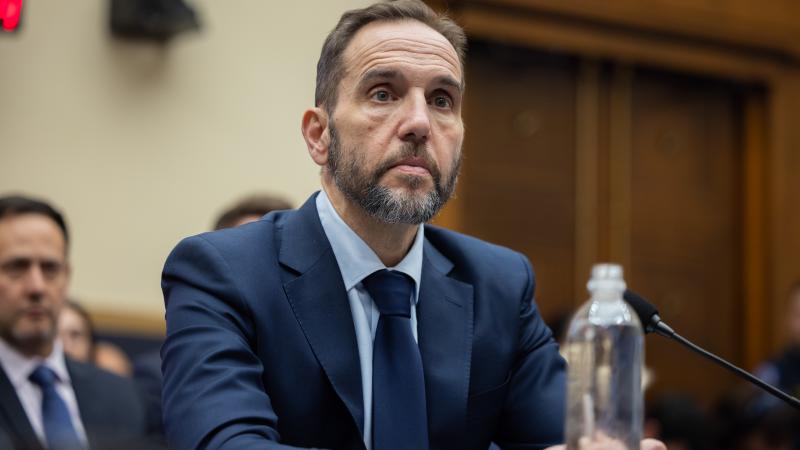Republican House majority adjourns with some wins, but much unfinished business ahead
Two issues that the House has yet to resolve is federal spending, which is higher than it was compared to this same time last year and reforming the government surveillance program of U.S. citizens abroad
The House Republican majority, now 221-to-213, is closing out 2023 with some legislative wins under their belt, but GOP lawmakers still have unfinished business on several key issues more than a year since rolling out their "Commitment to America" agenda that debuted in September of last year.
Under the "fight inflation and lower the cost of living" part of the agenda, the House GOP intended to "curb wasteful government spending that is raising the price of groceries, gas, cars, and housing, and growing our national debt."
The Fiscal Responsibility Act reflected the deal former House Speaker Kevin McCarthy and President Biden made to raise the debt limit by $1.5 trillion. It included returning to fiscal 2022 domestic spending levels and limiting domestic spending growth by 1% annually.
The GOP-led House passed a 45-day temporary continuing resolution ("CR") without any changes to federal spending levels to avoid a government shutdown on Oct. 1.
House conservatives objected to the CR, which received votes from Republicans and Democrats to pass the House and Senate. McCarthy was ultimately ousted from his position on Oct. 3 after Rep. Matt Gaetz, R-Fla., introduced a motion to vacate the chair that passed with a small amount of GOP votes and votes from all Democrats.
Under his successor, House Speaker Mike Johnson, the House passed a “laddered” CR with a final funding deadline of February 2, 2024. Rep. Warren Davidson, R-Ohio, and other House conservatives criticized Johnson’s approach to the temporary spending bill, saying it continues current federal spending and doesn’t reduce the deficit.
"No one campaigned on the status quo," Davidson told reporters. "No one campaigned on sustaining the spending levels or policies that have been implemented by Biden, Schumer and Pelosi and that's what this does until January and February but it really does worse."
The House still has not passed all of the 12 single-subject appropriations bills that they have been working on. Conservative members have argued that passing each appropriations bill separately would make it easier to find areas in which spending could be cut.
Overall, federal spending is up compared to this same time last year. The national debt is nearly $34 trillion, due in part to an increase in federal spending of $64 billion.
On non-fiscal matters, the House has not yet passed any Foreign Intelligence Surveillance Act (FISA) reform, which was a key promise from Republican leaders.
Republicans and some Democrats have called for Section 702 of the law to be changed so that a warrant would be required for surveillance of U.S. citizens' communications abroad. Congress, instead of passing a reform bill before the end of the year, temporarily extended FISA in its current form through April 19 as a part of the defense spending bill. The National Defense Authorization Act received more votes from Democrats in the House than Republicans, 163 to 147.
Under McCarthy, the House did pass border security-related legislation but it has been stalled in the Democratic-led Senate.
If enacted, the bill would have tightened border security with additional physical barriers along open areas of the U.S.-Mexico border, as well as enhancing the use of technology at the border and bringing back the Trump-era "Remain in Mexico" policy.
During the current session of Congress, there hasn’t been any significant changes to Biden’s border policies.
On the impeachment front, the GOP majority pledged to continue to investigate the Biden family's foreign business dealings. The investigation has been underway in several committees and this week the House formally passed an impeachment inquiry resolution against Biden Wednesday on the House floor.
The final vote was 221-212.
House Republican leaders have alleged that the Biden Administration and Hunter Biden are unlawfully refusing to cooperate with their investigation into the president's potential role in his family members' foreign business dealings. Hunter Biden appeared on Capitol Hill Wednesday to make a statement critical of the House investigation but has refused to participate in closed-door testimony. Biden may face Contempt of Congress charges, according to the Associated Press.
“This vote will allow the House Judiciary, Oversight and Ways and Means committees to continue their investigations. The evidence mounting against the president cannot be ignored,” House Majority Whip Tom Emmer told reporters on Wednesday.
Prior to the 2022 midterm election, McCarthy also pledged that the House GOP would vote to eliminate the White House's request for additional federal funding for up to 87,000 new Internal Revenue Service agents that was included in the Democrats' $780 billion Inflation Reduction Act.
The Democrats passed that bill without Republican votes through the budget reconciliation process. The GOP-led House passed the bill repealing the additional IRS funding shortly after the new session of Congress began in January. The Senate has not voted on that measure.
The GOP's "Commitment to America" agenda also called for enacting a "Parents’ Bill of Rights" after the lengthy school closures and heated school board meetings during the COVID-19 pandemic. The agenda also included passing legislation to protect “fairness by ensuring that only women can compete in women’s sports."
The House later passed legislation that would implement a "Parents’ Bill of Rights" and prevent transgender women from competing in women's sports leagues. The legislation also has not moved through the Senate.
The House GOP leadership also pledged to "crack down on prosecutors and district attorneys who refuse to prosecute crimes." The House eventually passed a bill to block a local Washington, D.C. crime bill, which would have lowered penalties for such crimes as robberies and carjackings. The bill passed in the Senate and Biden signed it into law. It comes as a reaction to public criticism of prosecutors sponsored by radical leftist billionaire George Soros ignoring quality of life crimes.
As speaker, McCarthy helped create a bipartisan Select Committee on China to examine policies that would help the U.S. better compete with China.
McCarthy also formed the bipartisan House Judiciary Committee Subcommittee on the Weaponization of the Federal Government to examine to federal government’s role in censorship on social media, college campuses and other areas.
The Facts Inside Our Reporter's Notebook
Links
- Fiscal Responsibility Act
- Rep. Warren Davidson
- federal spending is up
- section 702
- bill would have tightened border security
- Trump-era "Remain in Mexico" policy.
- House floor
- family members' foreign business dealings
- Biden may face Contempt of Congress charges, according to the Associated Press
- 87,000 new Internal Revenue Service agents
- Parentsâ Bill of Rights
- competing in women's sports
- passed a bill
- Select Committee on China
- bipartisan House Judiciary Committee Subcommittee on the Weaponization of the Federal Government
















